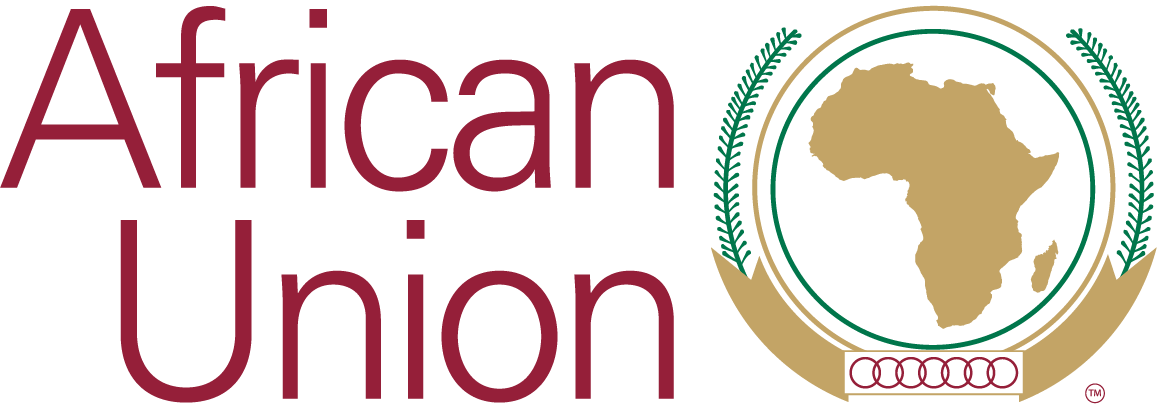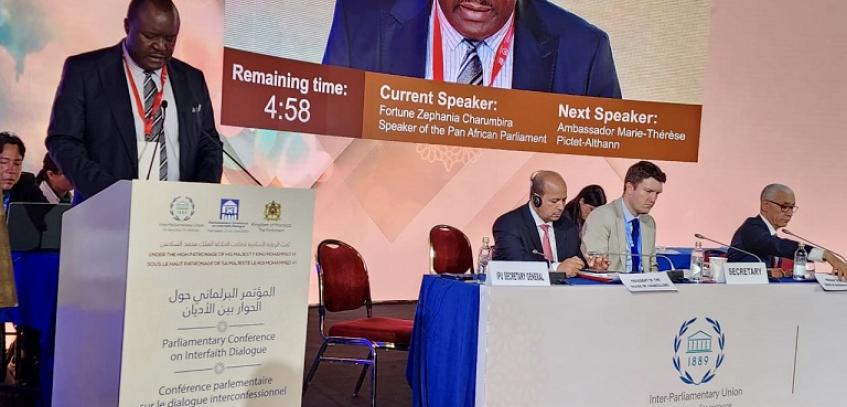The President of the Pan-African Parliament (PAP), H.E. Hon. Chief Fortune Charumbira has urged political and religious leaders to act as vectors for tolerant, inclusive, and peaceful societies.
As part of his resolve to ensure that the voice of African citizenry finds expression in global parliamentary diplomacy, the leader of the Pan-African Parliament today addressed the first Parliamentary Conference on Interfaith Dialogue, convened by the Inter-Parliamentary Union (IPU) and the Parliament of Morocco. Held under the theme: “Working together for our common future”, the interfaith gathering is taking place until 15 June 2023 in Marrakesh.
In his address, H.E. Hon. Chief Charumbira briefed the audience on the objectives of the Pan-African Parliament especially as it relates to the promotion of peace, security, and stability. The President therefore explained that the presence of Africa’s Premier parliamentary forum at the Marrakesh interfaith gathering was in alignment with its mandate of promoting peace, security and stability through tolerance, inclusivity, and respect for diversity.
In this regard, the President of the Pan-African Parliament recognised the incommensurable influence wielded by religious and political leaders and their capacity to build resilient societies, where all members feel included. On the other hand, H.E. Hon. Chief Charumbira cautioned that if not used responsibly, and for the greater good of mankind, the influence can foster intolerance, cultism, and the conflicts and fatalities attendant to them.
Citing examples where political and religious influence has had negative impacts, the President noted the ongoing conflict in Sudan caused by a political and military stand-off, which has claimed over 1000 lives, displaced more than 1.4 million people with a further 476 800 fleeing to neighbouring countries. The President further highlighted a case in Kenya where at least 201 bodies were found at a ranch of a pastor who allegedly told his followers to starve themselves to death to meet Jesus.
“The examples I have given above underscore the timeliness and relevance of this Conference and I must once again applaud the Inter-Parliamentary Union and the Parliament of Morocco for convening this conference. Our people can either become victims or perpetrators of intolerance on the basis of their beliefs but they can also be agents of change in encouraging tolerance, promoting dialogue, inclusivity and respect for diversity if we lead them in the right direction. Parliamentarians, as community and opinion leaders, have an important role to play in meaningfully engaging with the values and worldviews of their constituents, many of which are influenced by religion or belief,” said H.E. Hon. Chief Charumbira.
The Leader of Africa’s Parliament was adamant that religious and political leaders must look within themselves to effect change in the world: “I will draw on the sobering words of the great Indian leader, Mahatma Gandhi who said, “You must be the change you wish to see in the world.” The late former Vice-President of Zimbabwe, Dr. John Landa Nkomo, (God rest his soul!) amplified this by saying, “Change begins with you. Change begins with me. Change begins with all of us.” As politicians and religious leaders we are revered by our people as opinion leaders. Even before we look at what our Parliaments or congregants are doing, we must start by asking ourselves, what are we doing to make this world a better place for our children to live in regardless of race, gender, ethnicity, religion or political affiliation?” asked H.E. Hon. Chief Charumbira.
He added: “Parliaments and Parliamentarians must ensure that human rights are upheld, without distinction of any kind, be it religious or otherwise. Religious leaders also wield an influence comparable to political actors Moreso with the growing prominence of the ‘Man of God’ some of whom have been elevated to the status of deities. We thus have a collective responsibility to leverage on our influence to inform, educate and raise awareness among our people on the importance of tolerance, inclusivity and collaboration and thus transform our societies into peaceful, tolerant and inclusive societies.”
Additionally, H.E. Hon. Chief Charumbira demanded that politicians and religious leaders responsibility for causing intolerance and the consequences thereof in many cases. He called on them to play a role in curbing incidences of xenophobic, ethnic, gender-based, racial and political violence, all of which point to intolerance of differences, intolerance of divergent opinions and discrimination.
“As a continental Parliament, we have debated and spoken out against racism, xenophobia, religious and political intolerance and we shall continue to do so. We cannot afford to remain silent. We have a duty to hold our Member States to account and ensure that we promote peaceful co-existence. Research has found that countries that uphold freedoms have more vibrant and democratic political institutions, rising economic and social well-being, diminished tension and violence, and greater stability.” H.E.Hon. Chief Charumbira indicated.
Lastly, the President of the Pan-African Parliament called for synergies between politicians and faith leaders to provide sustainable and long-lasting solutions to challenges facing the world in general and Africa in particular. “Africa is still riddled with a lot of challenges, chief among them, poverty, unconstitutional changes of government, rising incidences of conflict, the ravages of climate change, terrorism and violent extremism, unemployment, migration, energy insecurity and the looming threat of hunger and malnutrition. The resolution of these challenges requires a concerted approach by all regardless of religion or political affiliation. It is, therefore, critically important now more than ever for political and religious leaders to come together to work towards a common future for posterity instead of focusing on issues that undermine socio-economic development.” He concluded.








